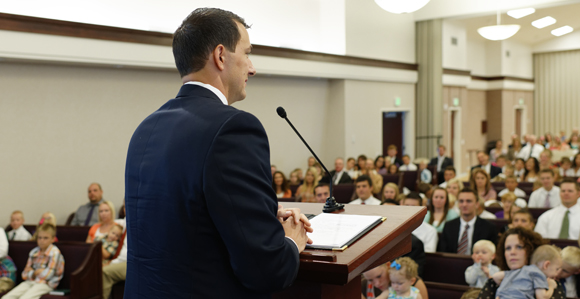A Gallup poll was administered in 2001 that asked Americans what they feared most. Snakes topped the list, but public speaking came in 2nd. Many Americans writhe at the idea of getting in front of a crowd and speaking. In the LDS faith, members are asked to do this rather consistently. If the apprehensions of LDS church members resemble the poll data collected by Gallup, the only thing scarier than speaking in front of a large group of people would be speaking in front of a large group of people while others throw snakes at you.
I think it is understood within the church that, while there are some who enjoy sharing things they have learned, there are many who dread the idea of giving a talk in sacrament meeting. I decided to write this post to help those who just want to write a talk that will sound like every other talk that you hear. You know, one that will fit the form so well that it will just blend in to every other talk they’ve ever heard. In other words, I will set up the framework for the classic Mormon talk that you might hear on any given Sunday, in any American ward.
Part 1: Publically express your lack of enthusiasm for what you’re about to do
This is the classic Mormon way to start a talk. “Well, I really didn’t want to give a talk, but the Bishop cornered me after Young Men’s on Wednesday and forced me to do it.” Great! Nothing better than humiliating your poor Bishop by framing him as a creepy stalker. Imagine starting a date off, and the person you asks tells you, “Well, I didn’t really want to go on this date at all, but you cornered me after Singles Ward and I just felt embarrassed and awkward and you pressured me to go on this date.” 
Also, I think a lot of people use this intro to deflect the blame to the person who asked them to speak as well. In other words, if the talk turns out horribly, it is the Bishopric’s fault.
Part 2: Define, define, define
My brother dated a girl who was not a member of our church for a bit. She came to church with him a few times. One thing she noticed was the high frequency of quotations from the dictionary. Anyway, we joked within our family that maybe we could effectively canonize the dictionary, making it the 5th standard work. I’ve even heard the dictionary quoted numerous times in General Conference. Online dictionaries work too- Elder Hales, for example, visited 10 different online dictionaries to better understand the concept of agency in 2010. So, just grab the closest dictionary and look up the word you’re supposed to talk about. Everyone else is doing it.
Part 3: Share some story or quote of questionable veracity
Let’s face it. We LDS people are a “believing” people (an attempt at tact- I mean to say that we are super gullible). We have a long history of believing things without physical evidence. And when we hear a faith promoting story, we love it- even if it is of questionable veracity. There are hundreds of urban legends and quotes without sources floating around in the church. I would say it should stop, but honestly, we will never be able to eliminate all of them. We will continue to believe that Einstein admired James E. Talmage’s intelligence. We will propagate the myth about the little girl recognizing Christ in the Del Parson painting.
I heard these a lot when I was younger. Back in the day of chain e-mails, these stories flourished. You know which ones I am talking about. The birdies, the buff angels that stopped the burglar from robbing a home, the youth were generals in the war in heaven, the tornado went around the temple…the list goes on. If you are unfamiliar with these stories, stick around and you will hear them eventually, I promise.
Part 4: Go way over the time
Alright. You’ve started out your talk expressing candidly that you didn’t want to come up here. You’ve used the dictionary, and you’ve started on the Birdies story. If you can force out the tears and grip the pulpit, even better. Now, if you don’t do anything else, make sure that you don’t stop on time. If you’re the middle speaker, talk all you want so that the high councilman can nervously chip away all of his meticulously worded counsel. If you’re finishing up the meeting, go way past the hour. I mean, we all are dying to know what happened to those poor birdies in cages. Ignore the screams of children, the congregation collectively peering over at the wall clock, and the fact that your church had planned to sing all four verses of ‘I Believe in Christ’ for the closing hymn. Just keep on rollin’. And somehow, you will bend time, so that those last 5 minutes of your talk actually feel like 30.
Alright, you’ve done it. Bear your testimony quickly, and then walk off the stage proudly.









As a former high councilor who has had to whittle away at my meticulously prepared messages every third Sunday for the last 5 years, I salute you Brother Hatton.
Confession: I have used the dictionary as a source for talks. Like, a lot.
But in all fairness, I really feel like sometimes people don’t know what these words even mean.
😉
Don’t worry, Leah. We all have.
Unfortunately, you can’t count on the middle speaker using all your time. For the first two times I spoke in one ward I had a combined five minutes. They got to hear my testimony, twice.
The third time, when my name was announced, I was looking at 40 minutes until the closing song and, because of the way the building was shared, no one was leaving early. I believe that was the week I suggested we sing the opening hymn again because the first go around had been such a lack luster effort. At least, Bro. Nelson, the chorister was happy.
#1 is spot on. The traditional opening is so worn out. I make it a point to start right with scripture. They know who I am and EVERYONE is gets asked to speak. We don’t need to rehash it people.
In lieu of the actual dictionary, the Bible dictionary or Mormon Doctrine or the Encyclopedia of Mormonism may be used.
You left a a classic:
Well I had a totally different talk prepared but the Holy Ghost is telling me to say something completely differently. I really have no idea what I’m going to say right now.
You’re right. And then everyone grips their seat…
Also, there’s the -“This talk was going to be really good but I left half of it at home” one.
Ugh, this is unfortunately so true!
Along with #1, is the comment that the speaker is no good at speaking and hates to do it. This happened the day my nephew was suppose to give his mission farewell talk. The first speaker spent 10 minutes talking about bad she is at speaking, giving previous examples of times she was bad at it, and a really lengthy story of how she got asked to speak. Lots of tears during her personal story to the point of not understanding it. Then she left 5 minutes for her husband and my nephew.
Also, if it’s a husband and wife duo speaking, the woman gets to spend 20 minutes of her talk telling their life stories.
Wonderful parody, Thomas!
I loved it.
Another “good” thing to do is to announce up front the subject you have been asked to speak about.
That way the congregation can check out quickly to dream land.
I think ultimately the problem stems from the fact that we usually have “talks” to fill time rather than because we have something to say.
(See: General Conference)